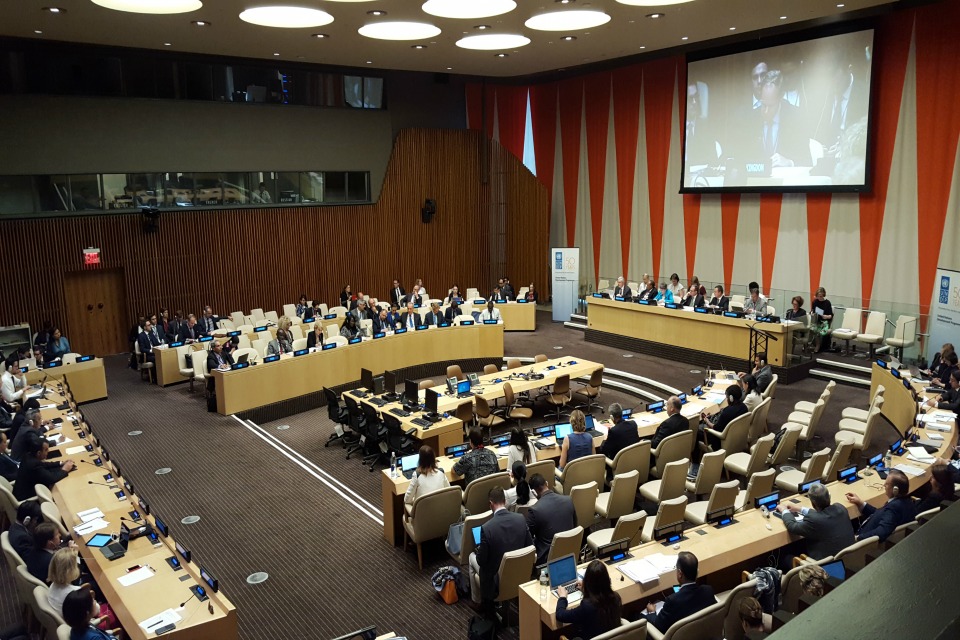68 million voters registered. Access to legal aid for 2.1 million. Better access to energy for 2.5 million... Such advances transform lives.
Statement by Ambassador Matthew Rycroft of the UK Mission to the UN at the UNDP Executive Board

Thank you Mr President. Madam Administrator, thank you for your statement and your address and your leadership.
Last year, the international community reached three monumental agreements on the SDGs, on financing for development and the binding global deal to fight climate change. And this year there have been further commitments at the World Humanitarian Summit in Istanbul, and the Supporting Syria and Anti-Corruption Summits in London. UNDP was involved in all these processes and now UNDP is at the mid-point of it’s 2014-17 Strategic Plan. The UK looks to UNDP to help turn all of those agreements into impact. Let me address some of them now.
First of all, we thank you Madam Administrator for representing the UN at the Anti-Corruption Summit in London last month. With UNODC, UNDP can help countries root out corruption, as part of their efforts to achieve Goal 16 on peace, justice and strong institutions.
At the World Humanitarian Summit, it was clear that we have an opportunity to change lives through The Grand Bargain – including a billion US Dollars of savings – and the new Education Cannot Wait Fund. But the Summit also heralded a new relationship between humanitarian and development communities, rooted in shared analysis, monitoring and planning. We must sustain this momentum and ensure practical implementation to harmonise humanitarian and development action. This is especially important for the upcoming Quadrennial Comprehensive Policy Review negotiations. Here the UK will seek to overcome the structural impediments that sometimes hamper progress, including by increasing collaboration to achieve greater efficiency and impact.
And harmonising development and humanitarian approaches is not an exercise in grand theory, it is needed urgently in practice. And as you have pointed out, Madam Administrator, the Syria crisis presents a grave reminder of the need to get this right. Yes, the solution to this crisis needs to come from a political process, but we must address the acute humanitarian and development needs of the millions affected by the ongoing crisis.
So UNDP’s efforts to create jobs, foster resilience and development, and ensure efforts are coordinated in the face of the crisis remain vital.
We recognise that it has not been plain sailing since UNDP’s Strategic Plan began in 2014. We have faced severe challenges: economic uncertainty, environmental threats, protracted crises and displacement, to name just a few.
But despite these, I am glad that UNDP is on track towards achieving most of its Strategic Plan targets. 84 percent of outputs met or exceeded their 2015 milestones, and the majority of country programme outcomes targets were achieved too.
These statistics translate into striking improvements in peoples’ lives. 68 million voters registered. Access to legal aid for 2.1 million. Better access to energy for 2.5 million. And to take a few more examples, we are also pleased that targets were met on improving countries’ ability to deliver basic services, open governance, rule of law, access to justice, citizen security, conflict prevention and recovery from crisis. Such advances transform lives.
Organisational improvements underpin these successes – for example improvements in UNDP’s structure, and cost and value consciousness. And I particularly congratulate UNDP for again being ranked the most transparent aid organisation in the world.
So what needs to improve further?
Well while we welcome overall performance against the milestones set on parliaments, rule of law, access to justice, and conflict prevention, progress slowed noticeably in 2015 compared to the previous year. So UNDP cannot rest on its laurels and I know that under your leadership, Madam Administrator, it won’t do so.
We want to see improved results for women and girls on thematic areas including social protection, rule of law, access to justice, citizen security and post-crisis social cohesion. We also want to see more gender mainstreaming and improved use of gender markers.
And we would like UNDP to modernise further, be flexible to remain relevant. This includes making improvements on human resources, programme analysis and delivery, monitoring and evaluation, and risk management. Given the importance of implementing partners, UNDP needs robust controls and assurance processes, to ensure that resources reach the right people and are used for the intended purposes.
We welcome UNDP’s ambition on structural change and results-based management, and we note that the shape and quality of this report is itself a product of creative reform. Improvements include the increased disaggregation of results by gender and geography as well as the response to our request for a clearer picture on organisational effectiveness and the impact of this on outcomes. In future we’d like to see even more exposure of the impact on individual outcomes.
Continual reform will help to attract financial resources. UNDP requires predictable, flexible, high-quality funding to achieve the ambitions contained in the strategic plan. We strongly support UNDP’s continued efforts to diversify its funding base, both amongst member states, and from the private and philanthropic sectors, and encourage fellow member states to step up. We look to UNDP to adjust its business model to help keep its finances sustainable.
Mr President, Madam Administrator,
The coming year will present a real test for UNDP and the international community. By continually analysing and correcting the way we work, we can rise to the challenges we face united. Half a century since UNDP’s creation, the UK still looks to UNDP to help achieve our shared goals, and thereby improve the lives of people across the globe.
Thank you.